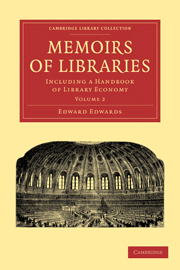Book contents
- Frontmatter
- Contents
- Chapter XV The Older Libraries of English Towns, and Their Management By Munic
- Chapter XVI The Parochial and Quasi-Parochial Libraries of England
- Chapter XVII The History of The “Public Libraries Acts” of 1850 and 1855
- Chapter XVIII The Working of The Public Libraries Acts of 1850 and 1855
- Appendix to Volume I
- Part The First. History of Libraries (Continued.)
- Book IV. The Libraries of The United States of America
- Book V. The Modern Libraries of Continental Europe
Chapter XVII - The History of The “Public Libraries Acts” of 1850 and 1855
Published online by Cambridge University Press: 29 August 2010
- Frontmatter
- Contents
- Chapter XV The Older Libraries of English Towns, and Their Management By Munic
- Chapter XVI The Parochial and Quasi-Parochial Libraries of England
- Chapter XVII The History of The “Public Libraries Acts” of 1850 and 1855
- Chapter XVIII The Working of The Public Libraries Acts of 1850 and 1855
- Appendix to Volume I
- Part The First. History of Libraries (Continued.)
- Book IV. The Libraries of The United States of America
- Book V. The Modern Libraries of Continental Europe
Summary
A willing Legislature could say very many things… with effect. and to whatsoever vested “Interest,” or such like, stood up, gainsaying merely “I shall lose profits,“—The willing Legislature would answer “Yes; but our sons and daughters will gain health, and life, and a soul.”
CARLYLE. Past and Present. 355.Our Ancestors legislated; we write Treatises onLegislation. Without knowing how, They made laws which lived for centuries, and promise to live for centuries to come. We know how,—at least, we do not doubt it,—and yet one seldom expects that any law enacted during The last Session will escape without eiTher revision or repeal The next; beyond which it would be inviduous to ask how many members of our Legislature project Their minds.
HARE, Guesses at Truth, ii, 10.BY The middle of The nineteenth century it had come History of The to be obvious to many minds that if The advantages of Public Libraries were really to be popularized m Britain, some new machinery must be employed. Three hundred years had elapsed, since Bishop Bale’s lament that There was not in each English shire, at least one Library “ for The preservation of noble works, and preferment of good learning.” Another century passed on with all its mighty changes, but in this particular The most competent witness of that generation had still to note that “we in England are so defective of good Libraries, both ‘ among The gentlemen and in our greatest towns,’ that ‘Paris alone, I am persuaded, is able to show more than all The three nations of Great Britain.’” These, it will be remembered, are The words of John Evelyn.
- Type
- Chapter
- Information
- Memoirs of LibrariesIncluding a Handbook of Library Economy, pp. 772 - 792Publisher: Cambridge University PressPrint publication year: 2010First published in: 1859



